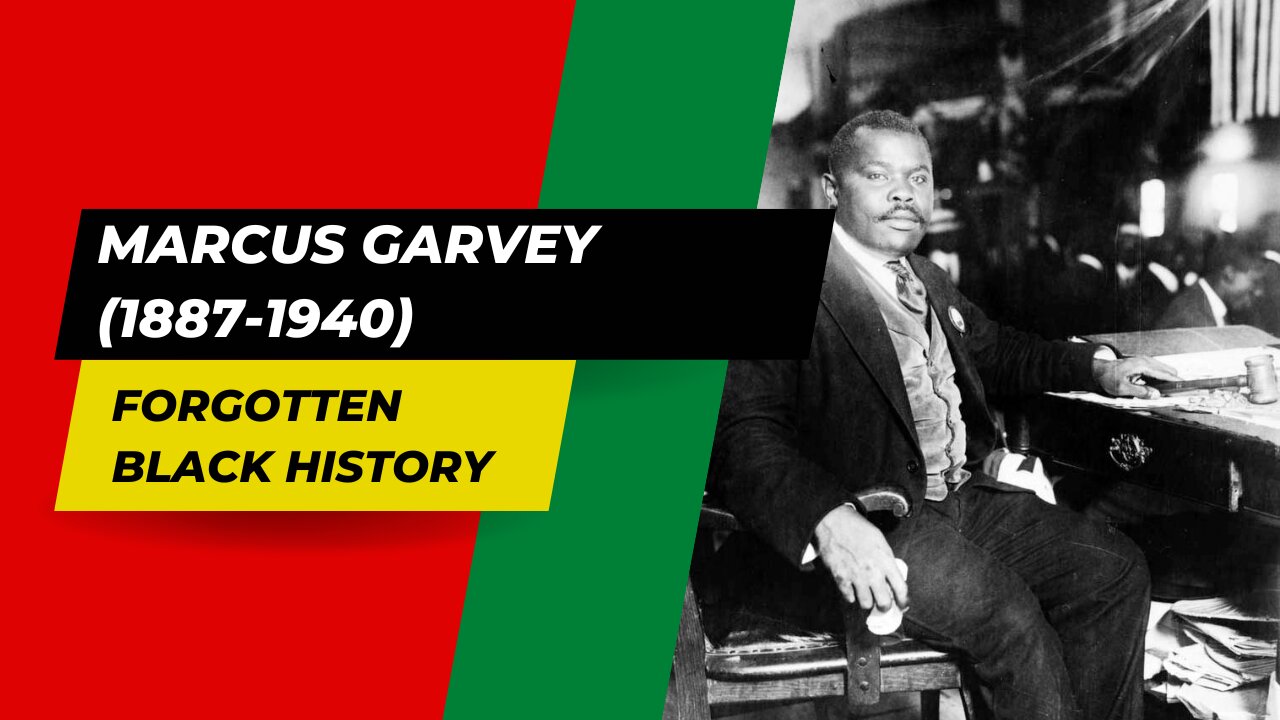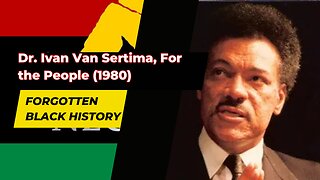Premium Only Content

MARCUS GARVEY (1887-1940)
This video is brought to you by, Fiverr: https://go.fiverr.com/visit/?bta=500952&brand=fiverrhybrid
Fiverr Learn: https://go.fiverr.com/visit/?bta=500952&brand=fiverrlearn
Fiverr Business: https://go.fiverr.com/visit/?bta=500952&brand=fb
Become a Fiverr Affiliate: https://go.fiverr.com/visit/?bta=500952&brand=fiverraffiliates
Fiverr Workspace: https://go.fiverr.com/visit/?bta=500952&brand=workspace
Welcome to "Forgotten Black History". On this channel we talk about special places, events and people in Black History, This page serves as an index to the prominent figures featured throughout the Black History society. Black history is the story of African Americans in the United States and elsewhere. We want to celebrate, remind, and pay respect to not only African Americans but Black people of all races and backgrounds. We hope you subscribe to join the family, so we can grow a small community to help people of all races know just how special black people actually are in the world. Thank you for taking the time out to visit our channel. We hope you subscribe, if you hadn't already. We wish you peace and love, and for you to stay safe out there.
#BlackHistory #ForgottenBlackHistory #BlackPeople
Check out our Rumble page for exclusive videos: https://rumble.com/c/c-1788327
Marcus Mosiah Garvey, one of the most influential 20th Century black nationalist and Pan-Africanist leaders, was born on August 17, 1887 in St. Ann’s Bay, Jamaica. Greatly influenced by Booker T. Washington’s autobiography Up From Slavery, Garvey began to support industrial education, economic separatism, and social segregation as strategies that would enable the assent of the “black race.” In 1914, Garvey established the Universal Negro Improvement Association (UNIA) in Kingston, Jamaica, adopting Washington’s inspirational phrase “Up, you mighty race; you can conquer what you will.” By May of 1917, Garvey relocated the UNIA in Harlem and began to use speeches and his newspaper, The Negro World, to spread his message across the United States to an increasingly receptive African American community. His major audience included the thousands of Southern blacks who were then migrating from the “shadow of slavery and the plantation” to the urban North. Black veterans of World War I were another Garvey audience. Most of them had experienced both French equality and US military bigotry and returned home as militant “race men.” They were attracted to Garvey’s calls. The UNIA grew larger still following the race riots in the Red Summer of 1919.
Garveyism resonated with the rapidly urbanizing black community and spread beyond the United States to the Caribbean, Latin America and Africa. Regardless of the locale, Garvey’s UNIA promised black economic uplift via self-reliance, political equality via self-determination, and the “liberation of Africa from European colonialism via a Black army marching under the Red, Black, and Green flag of Black manhood.” Africa’s redemption, according to UNIA supporters was foretold in the messianic Biblical Psalms 68:31 “Princes shall come out of Egypt; Ethiopia shall soon stretch out her hands unto God.” However, it was Garvey’s ability to convey, in his vivid and powerful speeches, the distinct possibility of achieving these goals that led the UNIA to become an organization of millions. When Garvey bellowed, “I am the equal of any white man [and] I want you to feel the same way,” he inspired the faithful and attracted the curious. Addressing the gender question Garvey wrote, “Black queen of beauty, thou hast given color to the world…Black men worship at thy virginal shrine of purest love…!” Garvey even created a new black faith by ordaining Reverend George Alexander McGuire as Chaplain General of the African Orthodox Church. McGuire’s sermons urged Garveyites to “Erase the white gods from your hearts.”
At the 1920 UNIA International Convention at Madison Square Garden, with twenty five thousand delegates and observers in attendance, Garvey issued the Declaration of Rights of the Negro Peoples of the World. The convention also produced the Universal Ethiopian Anthem. The Negro World, the official newspaper of the UNIA, also spread the organization’s philosophy globally. With a circulation of over 200,000 and published in three languages, Spanish and French as well as English, the Negro World was read on four continents.
-
 1:01:09
1:01:09
Forgotten Black History
3 months agoDr. Ivan Van Sertima, For the People (1980)
1183 -
 1:18:33
1:18:33
Dr. Drew
5 hours agoNew Hotline To Report "Conspiracy Theorist" Family & Friends w/ Ralph Schoellhammer & Winston Marshall – Ask Dr. Drew
31K8 -
 1:48:39
1:48:39
In The Litter Box w/ Jewels & Catturd
22 hours agoSchumer Caves | In the Litter Box w/ Jewels & Catturd – Ep. 762 – 3/14/2025
44.6K10 -
 1:32:18
1:32:18
Twins Pod
11 hours agoViral UK "Creator" Lily Philips Comes To Las Vegas... | Twins Pod - Episode 56 - Lily Philips
58.8K18 -
 DVR
DVR
Robert Gouveia
4 hours agoTrump at Department of Justice! Pam Bondi & Kash Patel Join; TRO Latest Filings
30.9K24 -
 39:34
39:34
SLS - Street League Skateboarding
1 month agoBEST LINES FROM THE 2024 SLS CHAMPIONSHIP TOUR! - Nyjah Huston, Yuto Horigome, Vincent Milou & more…
31.9K -
 1:54:24
1:54:24
The Quartering
5 hours agoCrowder & Tim Pool QUIT Youtube, Trump's 4D Chess Works Again, Huge DOGE Win & BIG ANNOUCEMENT!
96.8K75 -
 1:03:48
1:03:48
Winston Marshall
7 hours ago“We Should Have Been Honest!” The Big Lies About Ukraine No One Wants To Admit | Konstantin Kisin
45.3K66 -
 1:55:41
1:55:41
Steven Crowder
8 hours agoMAJOR ANNOUNCEMENT: The Future of Rumble Live & Louder with Crowder
722K632 -
 1:02:32
1:02:32
Crypto Power Hour
5 hours ago $0.08 earnedThe Crypto Power Hour - The AI Health Revolution | EP04
13.5K1